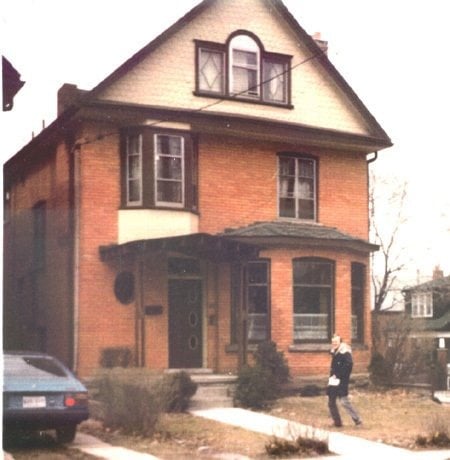A legacy built on Dignity, Hope, and Love
In 2024, Indwell celebrates a remarkable milestone — half a century of compassion, innovation, and unwavering commitment to providing dignity and independence for individuals with disabilities. From its humble beginnings to becoming a beacon of hope across communities, Indwell’s journey is a rich tapestry of triumphs, challenges, and profound impacts. As we honour this 50th anniversary, we invite you to explore the captivating stories and pivotal moments that have shaped Indwell’s legacy. Your engagement and support will help propel us forward as we continue to create inclusive communities, embrace new challenges, and embark on the next 50 years of transformational work together.
Timeline
The Homestead
A determined group of Christians in Hamilton put their heads together to devise solutions for adults with mental health disabilities. Starting with seven residents, The Homestead began Indwell’s vision of dignity and independence, supported by dedicated house parents.

A Change in Our Model
Following changes in psychiatric treatment and the rise of psychosocial rehabilitation, we pivoted to prioritize independent apartment living with a spectrum of supports. Caroline Apartments was born, offering 24/7 on-call supports and partnership with community organizations. Indwell now operates 13 supportive, affordable housing buildings in Hamilton.

Woodstock
We expanded to Woodstock, acquiring a group home. A successful grant led to Blossom Park Apartments in 2008, providing 61 supportive homes. In 2015, Harvey Woods Lofts opened and by 2018, Blossom Park added 34 Passive House-certified apartments, enhancing energy efficiency and affordability.

A New Name
It’s our 40th anniversary and a new name: Indwell evoking the presence of Jesus in our lives and ministry, and the welcome provided in a safe, stable dwelling.

Simcoe
By the mid-2010s, the demand for supportive housing grew in surrounding communities. Leaders in Simcoe contacted us and, with government funding and donations secured, Hambleton Hall opened. In 2022, Dogwood Suites doubled Indwell's presence in Simcoe.

London
We expanded to London with Woodfield Gate Apartments welcoming 67 individuals, in collaboration with St. Joseph’s and the Canadian Mental Health Association. In 2022, Embassy Commons opened, marking Indwell's 1,000th home.

St. Thomas
Railway City Lofts in St. Thomas is home to 15 residents. Funded by provincial and city grants, it offers intense therapeutic services. Some tenants from Railway City Lofts, after achieving more stability, moved into The Station, which opened in 2023 and offers more independence.

Waterloo Region
A partnership with Waterloo Regional Housing began, initiating Indwell’s programs in municipally-owned buildings Robert Kerr Manor and Weber Street Apartments. We’re grateful for similar partnerships with the cities of St. Thomas, London, and Hamilton. In 2023, St. Mark’s Place opened in a former Lutheran church in Kitchener.


Mississauga
Years of prayer and advocacy led to expanding into Mississauga. Lakeshore Lofts opened with 68 supportive affordable apartments. Cornerstone Suites opens in 2024, and we’re hopeful for a program in Clarkson as well.

The Future
Indwell now houses over 1,250 people in seven regions. What’s next? Among other projects, we’re excited to repurpose two London buildings – the old War Memorial Children’s Hospital and the Health Services Building – to create 138 supportive homes as part of Vision Soho Alliance. Because we’re not stopping until we see hope and homes for all!

We are indwell
The values that drive us
Dignity
We affirm the image of God in everyone.

Love
We love our neighbours.

Hope
Hope is the foundation of what we do.

Donate
I just wanted to pass along a sincere thank you to all of you at Indwell. I've seen firsthand the positive difference you are making in communities and the lives of individuals in need. It's quite amazing, really, what you've been able to accomplish. I would hope that your model of care and ability to put roofs over people's heads can be the inspiration and a "road map" going ahead for Ontario... and beyond!
I am donating my birthday to Indwell because I think Indwell values the inherent dignity of all people as image bearers of God. I think it is important people who might have trouble finding jobs and affordable housing have a safe to live to live, and I think that Indwell is doing just that.
I am so thankful to your staff and the entire Indwell team. My daughter finally found peace and love, and she has gotten way better. She is doing great and we are all so proud of her.
Indwell is high on my list of organizations that I respect because of the positive Christian image they project. This is powerful.
It is good to see your organization flourishing thanks to the awesome work that people like you continue to do. I remain thankful that those I care about had a safe and supportive place to live. A blessing in very unfortunate and complicated circumstances throughout the years.
I love what this organization is doing! Breaking down barriers, showing their residents God's love, creating healthy communities to live in, taking measures to remove the "broken window" effect, The list goes on and on!
Through your gifts you are providing affordable housing, supports, and community for Indwell tenants. This helps each person achieve health, wellness and belonging.
Get our emails
Stay up-to-date on what’s happening at Indwell as well as on upcoming events in your community.
Indwell is a Hamilton-based Christian charity that has been supporting vulnerable adults dealing with mental health challenges for 50 years. We are the fastest growing developer of new supportive affordable housing in Ontario. Indwell’s communities support over 1290 tenants in regions across Southern and Southwestern Ontario—with several projects currently under construction or pre-development. Indwell empowers tenants to achieve health and wellness goals, and to constructively engage with their communities.






